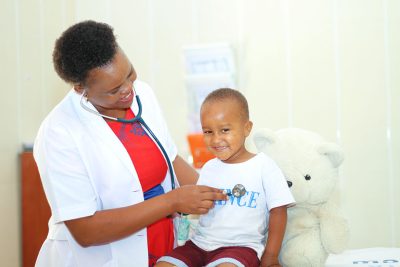+255 677 003 129
info@nhr.or.tz
Mon - Fri: 9.00am - 11.00pm
 Acute Care Unit
Acute Care Unit
The acute care unit (APCU) deals with children admitted with acute or severe illnesses and who needs close monitoring and care until they stabilize. Such conditions are those with emergency conditions including obstructed airway, severe respiratory distress, unconscious patients, renal failure, etc. The medical staff in this unit has special training on acute care. Patients get close monitoring and management and once have stabilized they are transferred to the normal wards.
Infectious / Diarrhea Unit
The infectious or diarrhea unit is dealing with children who present with diarrhea. Three major types of diarrhea are acute watery diarrhea, dysentery and persistent or chronic diarrhea. The main objective in treating diarrhea is to investigate the patient to establish the underlined cause, treat or eliminate the cause, and to prevent or treat dehydration which is associated with increased morbidity and mortality, and manage the complication of diarrhea mainly electrolyte and acid-base disorders. The unit is also involved in training of medical students, residents and other health care staff on the management of diarrhea.
Malnutrition Unit.
This is a special ward for children with severe malnutrition including kwashiorkor, marasmic Kwashiorkor and marasmus. Patients admitted in this unit have various degrees of severe acute malnutrition so the management is mainly focused on nutritional stabilization and rehabilitation. The patients are investigated for the underlying causes and are treated accordingly. Special milk formulas are used to rehabilitate the patients including F75 and F100. These are special milk formula with high caloric content which meets their nutritional requirements. In this unit patients stay for a long time because of their chronic condition. Mother or caretakers are also trained on home management and care of the severely malnourished child so that they don’t come back after discharge for the same problem.
Haemato-oncology Unit
This unit consists of very sick children who still needs care. In this unit there are rooms for diagnostic procedures including bone marrow aspiration, bone biopsy, tissue biopsy, lumber puncture, incision and drainage, cannulations and blood investigations.
The unit has one outpatient clinic which runs from Monday to Sunday to see new patients as well as follow up patients..
Neonatal Unit
The unit cares newborn babies of up to 28 days of life. Babies are kept in special rooms depending on the diagnosis or underlying problem and the rooms are provided with necessary equipment depending on the needs, e.g. incubators, resuscitation equipment etc. Services provided in the neonatal unit include:
Outpatients.
Each unit runs an outpatient clinic to follow up patients. Patients attending outpatient clinic include those discharged from the wards with and new patients referred from other centres but did not need admission.
These are patients with chronic or long standing medical problems include sickle cell anaemia and other anaemias, congenital anomalies, heart diseases, CNS disorders e.g. cerebral palsy, renal diseases e.g. nephotic syndrome, HIV infection, children with severe malnutrition, persistent or chronic diarrhea, malabsorption syndromes and other GI disorders, cancer patients etc. Outpatient clinic is run on a daily basis.
Ward Rounds
In each of the paediatric wards, ward rounds are conducted on a daily basis by Intern doctors along with resident and/or specialist. This includes weekends and public holidays. Major ward rounds are done twice a week by specialists along with the other junior doctors. Evening teaching rounds are also done daily for the admitting wards.
Training
The department is involved in training medical students. We are also involved in training intern doctors and Nurse Students and from time to time we receive elective students from different countries. As part of continuing education we conduct Journal clubs, grand rounds and intern case presentations each once a week.